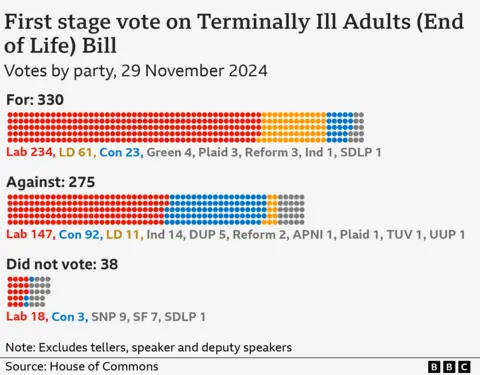Health workers must be authorized to withdraw from the process

Political journalist
Political journalist
Health agents would be authorized to choose to help with assisted death under the changes approved by deputies.
This decision was part of several adjustments to a bill that would allow adults in the terminal phase in England and Wales, who should die in the six months, to ask for help to end their own lives.
The legislation adopted its first stage in the House of Commons last November – but since then, the details have been placed and dozens of amendments added by both sides.
On Friday, deputies examined other potential changes, which also included the prevention of medical personnel to raise the possibility of dying to die with a patient first.
A vote of common goods on the opportunity to pass the bill as a whole at its next step or to reject, it is unlikely to take place until June 13 at the earliest.
By opening the debate earlier, Kim Leadbeater, the Labor MP behind the bill, said that many people had “lost dear beings in deeply difficult and traumatic circumstances”.
The deputy of Spen Valley added: “In simple terms, if we do not vot to change the law, we essentially say that the status quo is acceptable.”
Conservative deputy Rebecca Paul, who opposed the bill, argued that he should be put on the improvement of end -of -life care, rather than dying.
“It will harm many more people than it does,” said Paul.
“And the people who will be injured are among the most vulnerable of our communities and I am not willing to accept these collateral damages.”
During an emotionally busy debate, Labor MP Jess Asato accused the activist and disseminator Dame Esther Rantzen of being “unpleasant and disrespectful” of having accused the bills of the bill of having “unreacted personal religious beliefs which mean no precaution not satisfying” their concerns.
However, the daughter of Dame Esther, Rebecca Wilcox, told the BBC Breakfast that she was worried about the “beach between” flagrant lies “and” myths “circulating on the bill.
She said that even if she appreciated, there were concerns about coercion and how proposed legislation could affect vulnerable or disabled people, the bill was “full of guarantees”.
The former Minister of Labor, Anneliese Dodds, was part of those to make people fear that people could feel under pressure to undergo assisted death because they do not want to be a “burden”.
Labor deputy Dame Meg Hillier argued that doctors should not be allowed to raise the option of assistance to die with patients first.
She told the municipalities that “a serious risk presents that the already very vulnerable terminal patients will feel obliged to end their lives”.
But the conservative deputy, Dr. Neil Shastri-Hurst, a former surgeon, said that “highly qualified” health professionals should trust “to have the difficult and complex conversations they do every day”.
Several deputies have raised concerns, people with anorexia could be considered as sick in terminal phase and eligible for assisted death if they refuse to eat or drink.
However, Leadbeater argued that this risk was “negligible”.
“Not only would someone with severe anorexia be very little likely to be assessed as having the capacity to make a decision on death assistance, but the other tragic reality is that if a patient was so sick because of not eating and drinking for any reason, he would die before the assisted dying process could take place,” she told MPS.
Others have delivered emotional speeches to support the bill, the liberal democratic deputy Christine Jardine saying that her position was influenced by her experience to look at a family member die with a snowmobiler.
Jardine said “We don't want to lower the slippery slope”, but we suggested extending the bill to cover degenerative diseases.
Near tears, she added: “I would not want anyone who goes through what I witnessed without the choice to end it.”
The government is neutral on the bill and the deputies have received a free vote, which means that they can decide according to their conscience rather than having to follow a party line.

Plushater's Bill of adults in the terminal phase (end of life) cleaned up First parliamentary obstacle to 330 to 275 votes Back in November.
Since then, the bill has passed through six months Intense examination by a parliamentary committee And several modifications, in particular by deleting the need for a high court judge to sign each assisted death request. Instead, a panel of experts – including a law professional, a psychiatrist and a social worker – would supervise the process.
The question divided parliament, with strong opinions on both sides.
Those who opposed the assisted death say that the mood has changed among the deputies, but so far, only a handful has said that they had changed their minds since November and that dozens would take to block the bill.
Labor deputy Jonathan Hinder is the last to reveal that he will no longer support the bill, saying that his concerns were “deepened” as she progressed.
He gave the example of the elimination of the role of a high court judge as one of the reasons why he had changed his mind, adding that more work was necessary to make the bill “practicable and safe”.






